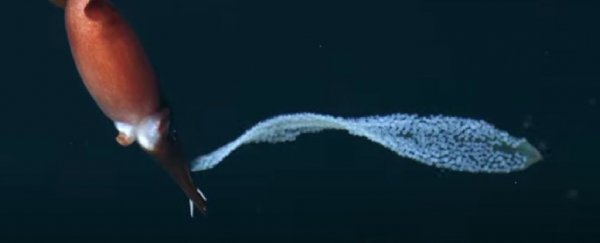It's a big ol' scary ocean out there. When you're just a teeny tiny embryonic squid, there are a lot of things that might like to have you for lunch.
One strategy, employed by a variety of squids, is to protect their eggs in a giant ball of gelatinous, slippery mucus. Some deposit their eggs directly on the seafloor. But at least one squid seems to have a different strategy.
Recent footage taken by researchers from the Monterey Bay Aquarium Research Institute in the permanent darkness of the bathypelagic depths has revealed a rare sight: a deep-sea squid of the genus Bathyteuthis carrying a dainty, lace-like sheet of hundreds of eggs as she swims through the cold waters.
Using remotely operated vehicles has allowed scientists to see a whole new world in the hostile darkness and crushing depths below the reaches of the Sun's light.
The new footage was obtained on a recent dive using the ROV Doc Ricketts, equipped with 4K cameras for high-resolution views of whatever critters it might encounter down there in the dark.
The squid mama spotted in the permanent darkness at a depth of 1,390 meters (4,560 feet) is only the second time scientists have seen Bathyteuthis squids exhibiting this brooding behavior.
The first was in 2005 when they witnessed another Bathyteuthis squid, also in the depths of Monterey Bay, carrying a sheet embedded with around 360 eggs.
Octopuses are famous for staying with and protecting their eggs, to tragic end. But only three species of squid are known to brood their young, and although it's not entirely clear what the reason is, keeping precious babies safe from nasty predators is likely top of the list.
Scientists believe there may be other brooding squids in the difficult-to-observe oceanic depths; there's a lot going on down there we don't know about.
It's also likely that squid mamas like this one will continue carrying eggs until they hatch, in order to give the hatchlings their best shot at survival. However, squids, like octopuses, are semelparous – they only reproduce once in their lives before dying. (Vampire squids can reproduce multiple times, but… they are not actually squids.)
This means that protecting her eggs so they can grow up into a new strong and healthy generation of squids is likely one of this doting mom's final acts.
